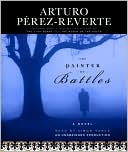

 |

|

The average rating for The Painter of Battles based on 2 reviews is 3.5 stars.
Review # 1 was written on 2014-06-27 00:00:00 harry cross harry crossAn internationally-known war photographer has hung up his camera and retired as a hermit to an abandoned structure near Barcelona. He is painting the entire interior of his lighthouse-type structure with a battle scene. It is a battle scene that transcends time, partly re-creating famous battle paintings from ancient ones to more modern ones like Guernica. The painter's work is interrupted by a visitor, a former soldier that the photographer captured on film in Croatia and made famous. The soldier and his wife were of different ethnic groups in the conflict; not a good thing when war breaks out between the two ethnic groups. (I'm reminded of the violence suffered by a couple - an Arab man married to a French woman -- during the Algerian war of independence against France, the theme of the book The Lovers of Algeria by Anouar Benmalek.) The Croatian soldier was imprisoned and tortured; his wife and child were killed. He announces he is here to kill the photographer for bringing this curse down upon him. Here the real story begins. The soldier who plans to kill the artist returns day after day. The two men discuss art, photography, life and death, violence, war, responsibility and guilt. There is a lot of technical talk about painting and photography: brushstrokes and shutter speeds. The book is slow in parts. The author knows his subject: he was a war correspondent covering wars all over the world. The book is translated from the Spanish. Paintings from top: The Battle Painting by Nocolas Poussin fineartamerica.com Guernica pablopicassso.org Battle of Little Big Horn by Edgar S. Paxton paintingandframe.com |
Review # 2 was written on 2020-07-30 00:00:00 Allan Dumas Allan DumasI am a fool for fine writing. I adore a sentence that says what it means, that clicks into place like a puzzle-piece, snug and thrillingly sufficient - comprehending as it must that it is part of a grander scheme and can't, on its own, afford to be oblique. I chide my own nouns and verbs and adjectives constantly: Save your narcissism for poetry! That is your debutante ball. This is your mission. Forge a bond with your brethren or suffer the red-pen consequences. Hundreds of beautiful, beautiful sentences have been cut down in their prime solely on the basis of their petulant refusal to become team players. (Those of you who compose know the agony of this.) Such is my foolish standard...and so it should come as no surprise that one of the shrines I worship at is under the somewhat constant construction of Arturo Perez-Reverte. Mr. Perez-Reverte is a Spanish author whose works may be familiar. His books include The Club Dumas, The Flanders Panel, The Queen of the South, and a collection of novels following the adventures of swordsman and soldier of fortune, Captain Alatriste. Should you choose to sample his stories, my advice is to start among these. The Painter of Battles is a different beast entirely. Here he draws the demons forward, resurrecting his extensive experience as a war correspondent to meditate on aggression and the brutality of the human spirit. Protagonist Andres Faulques is a world-renowned battlefield photographer who has retired, finally, to a ruined coastal watchtower known as Cala del Arraez. His remaining days, he has determined, will be spent on a single aim: expressing his knowledge of war through the painting of a darkly-elaborate mural that will encompass the walls of the first floor. He is well on his way to achieving this end when a stranger shows up at his door, announcing that he has come to kill him. Thoughtful conversations ensue. This is a short novel, dense with art history, existential philosophy, and stark travels through several of the cruelest conflicts of modern time - Bosnia, Lebanon, Romania, the Persian Gulf. Much is made of the intellectualization of evil and the elusive nature of a journalist's ethical responsibilities during a time of war. The text is quite fine, the intent exact, yet the subject matter (from an author who is clearly processing) may prove crushing in its burden. That said, Arturo Perez-Reverte remains a phenomenal wordsmith. And so my worship continues. |
CAN'T FIND WHAT YOU'RE LOOKING FOR? CLICK HERE!!!